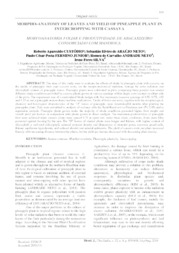Morpho-anatomy of leaves and yield of pineapple plant in intercropping with cassava.
Morpho-anatomy of leaves and yield of pineapple plant in intercropping with cassava.
Author(s): CUSTÓDIO, R. A.; ARAÚJO NETO, S. E. de A.; FERMINO JUNIOR, P. C. P.; ANDRADE NETO, R. de C.; SILVA, I. F.
Summary: The aims of this study were to evaluate the effects of shade in pineapple plant with cassava, on the yields of pineapple fruit sand cassava roots, on the morph-anatomical variation, damage by solar radiation and chlorophyll content of pineapple leaves. Pineapple plants were cultivated in plots comprising three parallel row sunder different shade conditions provided by cassava plants grown at various spacings within single rows located on either side of the plots. The experiment was of a randomized block design with five treatments (cassava spacings of 0.50, 0.75, 1.00 and 1.25 m and a pineapple monoculture) and four replications. Yields of fruits and roots, together with the morphological, chemical and histological characteristics of the "D" leaves of pineapple, were determined14 months after planting the pineapples plant. Data were submitted to analysis of variance with the Scott-Knott test or Friedman test (P< 0.05) and to regression analysis. Pineapple plants grown under the majority of shade conditions presented higher fruit weight and overall yield per hectare in comparison with plants grown in direct sunlight. The maximum productivities of pineapple fruit were achieved when cassava plants were spaced 0.75 m apart and, under these shade conditions, fruits were fully protected against burning by the sun. The ?D? leaves of shaded plants were longer and thicker, with higher content of chlorophyll a and total chlorophyll, reduced stomatal density and dimensions of stomatal pores, narrower guard cells, thinner aquiferous hypodermis, and reduced abaxial and adaxial epidermis. The yield of cassava roots per plant increased linearly with increasing distance between the plants, but the yield per hectare decreased with decreasing plant density.
Publication year: 2016
Types of publication: Journal article
Unit: Embrapa Acre
Keywords: Abacaxi, Analysis of variance, Ananas comosus, Análise de variância, Análisis de regresión, Análisis de varianza, Análisis estadístico, Cassava, Crop yield, Cropping systems, Cultivo intercalado, Cultivo intercalar, Friedman Test, Intercropping, Mandioca, Manihot esculenta, Morfoanatomia foliar, Método estatístico, Pineapples, Piñas, Radiación solar, Radiação solar, Regression analysis, Rendimento, Rendimiento de los cultivos, Scott-Knott Test, Shade, Sistema de cultivo, Sistemas de cultivo, Solar radiation, Sombra, Sombreamento, Statistical analysis, Teste de Friedman, Teste de Scott-Knott, Yuca
Observation
Some of Embrapa's publications are published as ePub files. To read them, use or download one of the following free software options to your computer or mobile device. Android: Google Play Books; IOS: iBooks; Windows and Linux: Calibre.
Access other publications
Access the Agricultural Research Database (BDPA) to consult Embrapa's full library collection and records.
Visit Embrapa Bookstore to purchase books and other publications sold by Embrapa.

